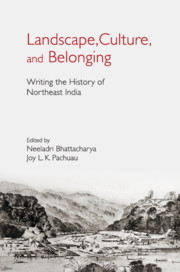Book contents
- Frontmatter
- Contents
- List of Figures
- Acknowledgements
- Introduction
- I Borders and Beyond
- II Surveys and Explorations
- III Ethnography, History, and the Politics of Representation
- IV Law, State, and Practices of Governance
- V Cultural Dialogues
- 11 Appropriating the Ao Past in the Christian Present
- 12 Why Do People Convert? Understanding Conversions to Christianity in Mizoram
- 13 From Sacred Rocks to Temples: Recasting Religion as Identity in Northeast India
- Notes on Contributors
- Index
12 - Why Do People Convert? Understanding Conversions to Christianity in Mizoram
from V - Cultural Dialogues
Published online by Cambridge University Press: 26 April 2019
- Frontmatter
- Contents
- List of Figures
- Acknowledgements
- Introduction
- I Borders and Beyond
- II Surveys and Explorations
- III Ethnography, History, and the Politics of Representation
- IV Law, State, and Practices of Governance
- V Cultural Dialogues
- 11 Appropriating the Ao Past in the Christian Present
- 12 Why Do People Convert? Understanding Conversions to Christianity in Mizoram
- 13 From Sacred Rocks to Temples: Recasting Religion as Identity in Northeast India
- Notes on Contributors
- Index
Summary
A study of Northeast India is incomplete without an examination of the region's association with Christianity. Several states of the region have a substantial number of Christian adherents, the result of nineteenth and twentieth century conversions. In the case of Mizoram too, the prominence of the religion cannot be missed. The landscape of the capital city of Aizawl, for instance, is dotted with churches, while everyday life significantly revolves around notions of ‘time’ set up by church practice. Most ‘ethnic’ Mizos claim to be Christian, although exact figures are wanting. Notwithstanding the presence of several ‘Christian’ and ‘indigenous religion’ based cult groups as well as non-Christian migrants, it is still 80 per cent of the population that professes Christianity. This makes Mizoram one of the few states in India that can claim to be predominantly Christian. In comparison, the national average is only a little over 2 per cent.
The collective consciousness of the Mizos, I believe, actively propagates a ‘Mizo Christianity’. Mizos are not just ‘Mizos’, but Mizo Kristian or ‘Christian Mizos’. The aim of this chapter is to examine the history of this nomenclature, and the cultural politics that underline it. I explore how ‘Mizo Christianity’ comes into being, how a ‘world religion’ becomes a local religion, and discovers a home in a specific social milieu. While such an appropriation is not unique to the region or even worldwide, what is unique in the Mizo case is the religion's close associations with the people's understanding of their identity. The religion, to a large extent, has become an important identity marker for the Mizos and, in the zones where the borders of identity-making are porous, Christianity also becomes an important tool of incorporation and exclusion. In other words, Christianity not only forms a crucial aspect of the identity make-up of the people, but also a criterion for the incorporation of new members into the Mizo fold. It is this easy identification with Christianity and its associated notions of progress that led people to convert in large numbers to Christianity. The chapter will not delve into the localness of Christian practice; rather, it focuses on how this ‘vernacularization’ has come to be, especially within such a short period of time.
- Type
- Chapter
- Information
- Landscape, Culture, and BelongingWriting the History of Northeast India, pp. 294 - 313Publisher: Cambridge University PressPrint publication year: 2019
- 2
- Cited by



